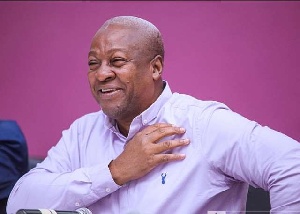- Home - News
- Elections 2024
- News Archive
- Crime & Punishment
- Politics
- Regional
- Editorial
- Health
- Ghanaians Abroad
- Tabloid
- Africa
- Religion
- Photo Archives
- Press Release
General News of Thursday, 8 May 2025
Source: www.ghanawebbers.com
120 Days in Office: Mahama’s second term records best Cedi performance across transitions since redenomination
The Ghanaian cedi has shown strong performance against the US dollar. This is the best first 120-day performance under President John Dramani Mahama. It ranks highest among all presidential transitions since the cedi was redenominated in 2007.
From January 7 to May 7, 2025, the cedi appreciated by 9.25%. It moved from GH¢14.71 to GH¢13.35 per dollar. This is the sharpest early-term gain for any president in over 15 years. It surpasses performances under Presidents Atta Mills, Akufo-Addo, and Mahama’s previous term.
Former President Akufo-Addo is notable for achieving cedi appreciation during his first 120 days in both terms since redenomination.
The current performance contrasts sharply with Mahama's first term in 2013. During that time, the cedi depreciated by 3.7%, falling from GH¢1.89 to GH¢1.96. The current administration may have learned from past mistakes or benefited from better macroeconomic conditions.
This turnaround is significant and reflects a mix of policy choices and external factors. Renewed investor confidence also plays a role in this recovery.
JoyNews Research indicates that this rebound is not coincidental. A combination of global dynamics has favored the local currency's strength.
The cedi’s rise aligns with a global shift away from the US dollar. BRICS nations and some African economies are adopting alternative currencies for trade. This trend weakens dollar dominance, especially after former President Trump’s tariff announcements.
This rebalancing of global trade offers emerging market currencies like the cedi some relief.
The Bank of Ghana has been crucial in this process by injecting dollars into the market to increase supply. The central bank has provided significant forex support to Bulk Oil Distributors (BDCs) for petroleum imports, stabilizing expectations in forex and import sectors.
Unlike previous administrations that increased spending sharply, the current government has limited fiscal spending so far in 2025. This restraint helps control inflationary pressures and limits excess liquidity in the economy.
By avoiding a spending spree during its honeymoon period, the government reduces demand for forex and supports exchange rate stability.
Ghana’s ongoing $3 billion IMF program boosts macroeconomic confidence as well. The IMF's strict conditions focus on expenditure control and revenue mobilization, reassuring investors and markets alike.
Ghana's gross international reserves rose above $9.3 billion this year, up from about $6.1 billion last year at this time. This increase gives the central bank more power to defend the cedi against speculation.
Despite lower oil export revenues due to global challenges, gold exports surged significantly this year—reaching $2.3 billion compared to $1.4 billion last year during the same period.
Cocoa export revenue is also recovering strongly post-COVID-19 pandemic disruptions. Inflows more than doubled compared to February 2024—rising from $369 million to an impressive $836 million within two months of 2025.
Additionally, under its three-year IMF program, Ghana secured debt moratoriums and haircuts that significantly reduce its debt servicing burden domestically and externally.











